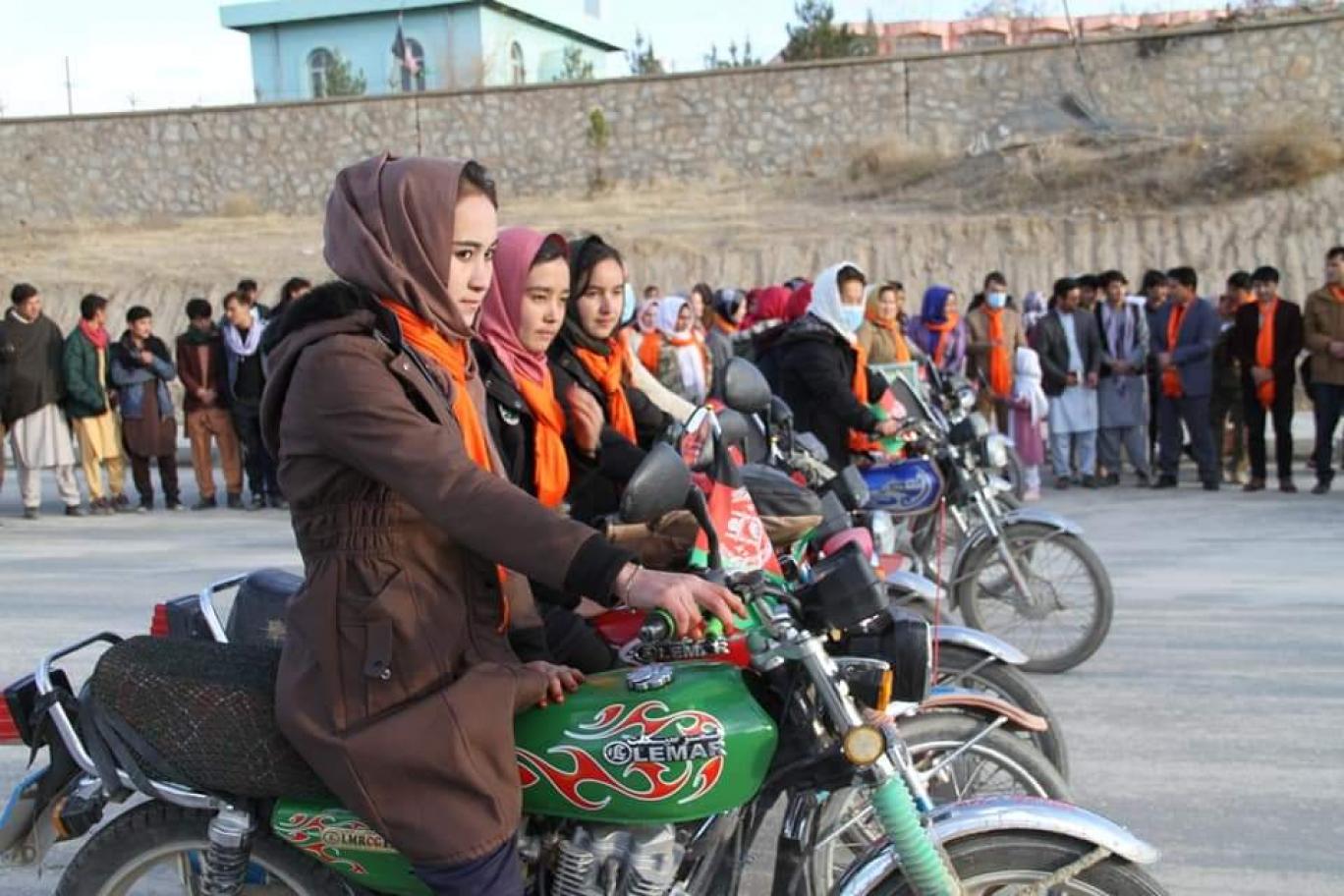 Women
motorcycle riders bring awareness of women's rights in
Afghanistan
Women
motorcycle riders bring awareness of women's rights in
Afghanistan
In early December 2020, a 16-day campaign to raise awareness about
domestic violence came to an end in Afghanistan, a campaign that
included 10 young Afghan women from the remote province of
Daykundi, central Afghanistan, riding motorcycles. The campaign
was designed to bring would bring people’s attention and support
to the issue of women’s rights in Afghanistan and was supported by
Oxfam International. (note: many campaigns against domestic
violence in Afghanistan are ongoing and new ones are launched
regularly).
It is rare for women in most Afghanistan to ride mopeds or
motorcycles except in the country’s mountainous areas and very
remote areas, where there are no proper roads and the sight of a
woman on a motorbike is, in fact, not uncommon.
The women motorcyclists from Daykundi called on other families to
let their daughters learn how to ride bikes so that their lives
could be made easier.
Marzieh Hamdard, director of the Women’s Affairs Office in the
Daykundi province, told Independent Persian: “This event
was organised to show that riding a motorbike is a normal
activity, and that women have the right to go about their day to
day lives in an open, safe and better environment”. Here is the story
in Persian and here
is the story in English.
With
cameras & smart phones, via motorcycles & tuk tuks,
volunteers map Dar es Salaam streets
Google Street View has not yet mapped the streets of many large
cities in developing countries, including Dar es Salaam, Tanzania.
These missing maps make it next to impossible to track traffic
congestion, to effectively deploy resources to poverty-stricken
communities and to build public transportation systems. Maps of
the city detailing roads, homes, streams, drains and other
features could help by becoming the first step in adequate city
planning, including for disasters. A joint effort involving
volunteers and organized by the World Bank and the Swedish
start-up Mapillary
aims to map the streets of Dar es Salaam. "Sparking the
community's interest in mapping has the potential to truly
transform Dar es Salaam into a prosperous city with the
infrastructure to prevent floods, bring awareness to the need for
flood prevention and risk reduction, and arm its citizens with the
right tools and skills to build a better city," states a World
Bank blog post celebrating the mapping efforts. As they
begin to come together, maps are being run through InaSAFE,
a free software that reproduces natural disaster scenarios to help
locals improve city plans and disaster response efforts.
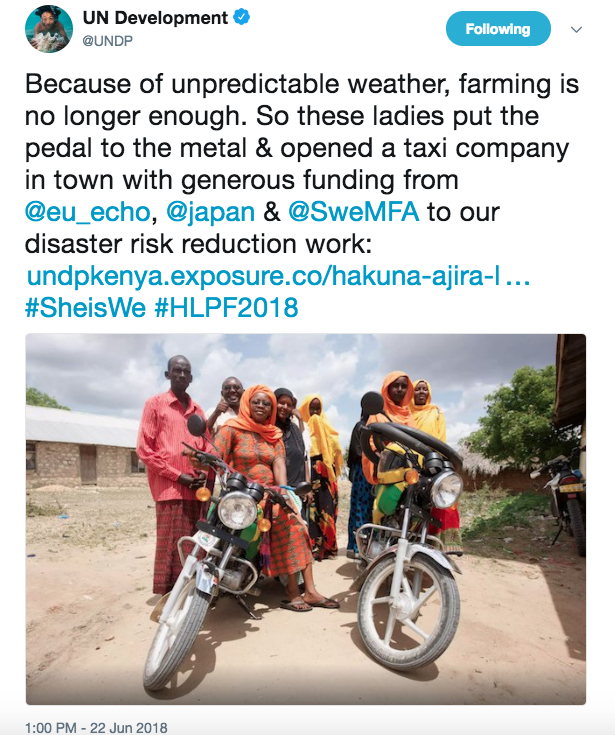
|
UNDP
This June 2018 tweet (pictured at the left) by the United
Nations Development Programme (UNDP) notes that, because of
unpredictable weather, farming is no longer enough for many
people in Kenya, including these ladies. As a result, these
Kenya ladies "put the pedal to the metal" and opened a
motorcycle taxi company in their town.
The project was supported with "generous" funding from the
European Union Commission, office of Civil
Protection and Humanitarian Aid, the government of
Japan, and the Swedish Ministry for Foreign Affairs.
The photo is of "Bike Women group members" with the two
motorcycles they received through UNDP and National
Drought Management Authority (NDMA) support
The original tweet was tagged with #SheisWe and #HLPF2018
Here is an
article about this program overall (but the photo
and tweet are all I could find out about the motorcycles,
specifically).
|
 Women
on motorcycles in Bangladesh
Women
on motorcycles in Bangladesh
A 2017 study found that 80 to 90 percent of girls and women in
Bangladesh have been victims of sexual harassment, verbal or
physical, in public places. The population of Bangladesh exploded
from 100 million in 1990 to over 160 million in 2019, and more and
more women are looking for paid jobs outside the home. Just like
women everywhere, women in the Bangladeshi capital Dhaka want to
be able to walk on the streets and take public transport without
men bothering them, including to and from their work places.
Public transport, especially buses, can be dangerous, as Roma
Atiqua recounts: on one trip, a man grabbed her breasts on a
packed bus. She was furious and knocked him off, but the other
(male) passengers were on his side. "You seduced him, he can't
help it."
And so, women in Bangladesh, as in
some other countries, have organized women-only
taxis through the chaotic traffic, including motorcycle and moped
taxis women at the wheel. That includes Atiqua, a 39-year-old
businesswoman and founder of Jabo Bohudur, a women's motorcycle
training facility. In 2018, the first motorcycle taxi service was
launched by and for women in Bangladesh: Lily Ride. Motor
riding is not without a struggle in this patriarchal society:
early pioneers were spit on and laughed at, pelted with
stones, and sometimes outright attacked.
Now, a new organization, Obon, has been added, part of parent
company OBHAI and it trains women to become scooter taxi drivers.
More than 300 women now drive for them, some with their own
scooter, others with a company scooter. Emergency GPS tracker
included. Depending on the talent and dedication of the drivers,
the motorcycle riding and taxi training takes one to three months.
The women learn to drive skillfully - the number one requirement
in this chaotic city - and also learn all emergency procedures,
basic engine mechanics and how to deal with difficult customers.
Women riders have participated in campaigns against domestic
violence, as is shown in the picture above.
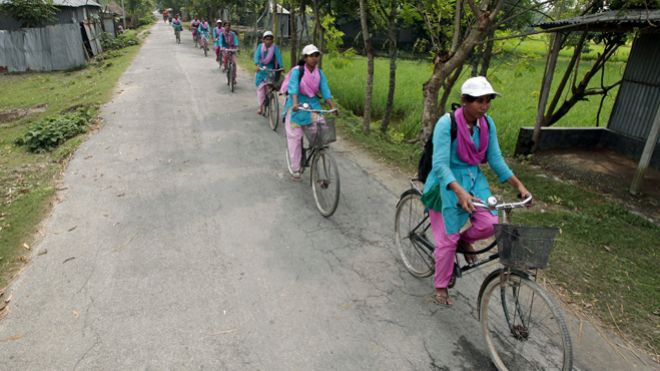
Bicycling
'Info Ladies' bring Internet to remote Bangladesh villages
Also in Bangladeshi, dozens of Bangladeshi "Info Ladies" ride
bicycles into remote Bangladeshi villages with laptops and
Internet connections, helping tens of thousands of people,
especially women, get everything from government services to
chats with distant loved ones. It's a vital service in a country
where only 5 million of 152 million people have Internet access.
The Info Ladies project, created in 2008 by local development
group D.Net and other
community organizations, is modeled after a program that helped
make cellphones widespread in Bangladesh. It intends to enlist
thousands more workers in the next few years with startup funds
from the South Asian country's central bank and expatriates
working around the world.
D.Net
recruits the women and trains them for three months to use a
computer, the Internet, a printer and a camera. It arranges bank
loans for the women to buy bicycles and equipment. Check out this
profile of a typical "Info Lady."
Motorcyclists
do good for Mandela's birthday
"A multiracial, multilingual group of South Africans have ridden
their motorbikes across the country's highways and byways for the
last week, doing good along the way." It was July 2011, and it was
part of the Bikers for Mandela Day initiative -- their gift to
Nelson Mandela for his birthday. Supported by the U.N., Mandela's
birthday is a day of public service, on which people are
encouraged to spend at least 67 minutes doing some kind of
community service in honor of the 67 years Mandela spent fighting
for social justice. "In the small town of Harrismith the bikers
stopped off to paint a small orphanage, adding a little color and
a little hope to the children's lives..."
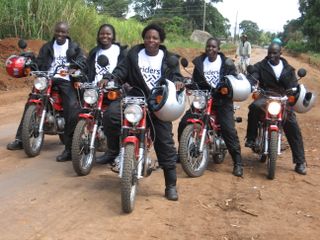 Riders
for Health
Riders
for Health
This is a nonprofit organization well know among adventure
motorcycllists world wide. The nonprofit uses motorcycles and the
training of local motorbike riders to improve delivery systems for
healthcare in Africa - specifically, remote villages in The
Gambia, Lesotho, Liberia, Malawi and Nigeria.
"Run by nationals of the countries in which we work, we employ
more than 600 men and women, from apprentice technicians to highly
experienced country leaders. We actively recruit and develop women
in all roles and at all levels."
At left is a photo of African women trained as
health care workers and motorcycle riders by Riders for Health.
These health care workers provide medicine and medical
information to families in remote, rural areas, navigating dirt
and mud roads and pathways, and crossing streams and rivers when
necessary.
The nonprofit has a terrific
YouTube channel showing how they work. If you watched the
television show Long Way Down, you saw Ewan
McGregor and Charley Boorman visit a Riders for Health site (and
it's how I first learned about the NGO and the role motorcycles
can play in humanitarian aid and development).
Motorcycles
helping to ensure access to maternal health services in
Zambia’s remote villages
The distance and lack of transportation from Mulala often prevent
pregnant women from reaching the health center, particularly in
instances of sudden onset of labor. FHI
360’s Zambia
Prevention, Care and Treatment Partnership (ZPCT II) project
is working in the Mansa District to ensure that pregnant women
have access to maternal health services. ZPCT II, funded by the U.S.
Agency for International Development (USAID), has provided
the Mansa District with 12 motorcycle ambulances and three
traditional ambulances to help transport pregnant women to local
facilities where a trained birth attendant can assist in their
deliveries. These efforts are part of Saving
Mothers, Giving Life, a public–private partnership that aims
to dramatically reduce maternal mortality by improving access to
and quality of maternal health care.
Motorcycle
Outreach
A nonprofit introduces and supports effective healthcare delivery
- by motorcycle - in remote areas of developing countries.
Motorcycle Outreach works closely with the UK Charity Riders for
Health (RfH), which supports primary health delivery in Nusa
Tenggara Timur (NTT) in eastern Indonesia. These two organizations
provide motorcycles for health workers, specifically midwives and
nurses working in public health centres that are responsible for
large areas but which have no means of transport to cover these
areas. Health care workers are trained on how to ride and on basic
maintenance, and the use of motorcycles is monitored by Health for
All and others such as community leaders, the Ministry for Health
in sub-district levels, NGOs and the public. Motorcycle Outreach
helps local people to manage and control the road worthiness of
the motorcycle fleet, to ensure that a Zero Breakdown principle is
maintained. The health workers responsible for the motorcycles
fill in a logbook and the riders themselves are regularly
evaluated. Read
more about their activities.
Relief
Riders International
This organization has been running has run two or three small
group trips via horseback, where travelers tour an exotic location
and provide some simple humanitarian relief to remote communities.
They have recently added trips via motorcycle. The service
provided by riders is more educational for the volunteers than
critically necessary for locals - you do not need to have any any
expertise, other than as a motorcycle rider, to participate in
these volunteer vacations.
Ted Simon
Foundation
A new foundation named for Ted Simon, a famous international
motorcycle traveler. It will "encourage and assist travellers in
making an extra effort to develop their observations and insights
into something of value for the rest of the world to share,
whatever their medium of expression might be... We believe that
individuals of good will, moving among foreign cultures and making
themselves vulnerable to the beliefs and customs of strangers,
have great importance in promoting world understanding, and even
more so when they can distill the essence of their experiences
into a form that can be absorbed by many."
Malcolm
Smith Motorsports Foundation helps children in Baja, Mexico
Baja, Mexico is a favorite
destination of adventure motorcycle riders from all over the
world. Established in 1998, Malcolm Smith Motorsports
Foundation says that it is a fully volunteer organization that
helps children in Baja. Facilities, utilities and most costs are
donated by Malcolm Smith Motorsports, ensuring all dollars are
used for the children. The foundation has paid for a
fully-funded education for every child involved in its program:
tuition, books, uniforms, travel and room and board where
applicable. The foundation has also paid for a facility,
water systems for both potable and agriculture water, electrical
system for the site, playgrounds and ball courts, a center for
after school studies and enrichment, beds, medical assistance in
US for extreme conditions, and a US-based summer internship
program for university age students.
Uganda’s boda boda babies: Indian-made motorcycle taxis come
to the rescue of pregnant women
Health services are uneven throughout Uganda. Some parts of the
country have village health teams deployed by the government to
help residents. In others, non-government organisations or
universities run projects that include community health work.
Since public transport is limited and ambulance services are poor,
boda bodas - motorcycle taxis - are the preferred form of
transport for people both in Uganda’s cities and rural areas. Most
of the motorcycles that ply on Ugandan roads, including Benic’s,
are Indian imports. Though boda bodas are not the safest form of
travel, especially for pregnant women, they are popular for their
efficiency, easy availability and low fares. As such, they have
become an intrinsic part of the country’s healthcare system. Used
to ferrying pregnant women, boda boda drivers like Benic have come
up with a few guidelines for how they conduct their service. They
make sure a relative accompanies the woman – which means three
people ride the motorcycle designed to carry two. This is to
ensure the mother-to-be, and the driver too, have some help at
hand in the all-too-possible event that the baby comes before they
reach the hospital. This
article by Priyanka Vora offers more; it's published in
Scroll.in, "an independent news, information, and entertainment
venture" focused on stories in or relating to India.
The Gender Desk - Rwanda
The Gender Desk was launched in May 2005 at the Rwandan National
Police Headquarters under the framework of the joint UNIFEM-UNDP
Project, "Enhancing Protection from Gender-based Violence." The
Gender Desk includes an interview room to enable women to speak in
confidence with a trained officer; a nationwide toll-free hotline
service for reporting gender-based violence; and a
UNIFEM-UNDP-funded adviser. UNIFEM facilitated quick reporting and
response to cases of violence and increased awareness among the
police and community of gender-based violence as a human rights
issue. Investigating officers have been trained in victim
empowerment, psychosocial support and victim/survivor protection.
Motorcycles, provided by UNIFEM-UNDP, enable them to respond
rapidly.
Members of the Global Aids
Interfaith Alliance, or GAIA, visited Blantyre, Malawi in
June 2003. "We spent time with the women who are part of the GAIA
program to strengthen women, thanks to a grant from the Gates
Foundation. Originally referred to as women's empowerment, the
program is now referred to in terms of strengthening the family,
as gender issues are a strong force in this culture.
Transportation is an enormous issue for our local trainees. Their
areas are large, and flooding in the rainy season makes many
villages inaccessible and many roads impassable. One of our
decisions was to make small motorcycles available to them. We also
provided them with cell phones. Both have been an enormous help as
they go about their work." Read
the entire story
Motorcycles
and horses provide key ways to help rural people in Lesotho,
a tiny country landlocked within South Africa about the size of
Maryland. 25% of its adults are HIV-positive. Pony riders to
transport blood tests, drugs, and supplies between remote mountain
health clinics and better-equipped hospitals at sea level. When
roads are navigable by two wheels, motorcycle
riders join the journey to further speed the process of
rushing blood to the lab or medication to those sick with HIV.
USAID and the Elizabeth Glaser Pediatric AIDS Foundation support
this effort.
eRanger:
Mobile Multimedia Classroom
The Digital Education Enhancement Project (DEEP) is a research and
development programme investigating the use of information and
communications technology (ICT) for teaching and learning. It
works in schools serving disadvantaged communities in different
parts of the world. Partners: Open University, UK, Eastern Cape
Department of Education (ECDoE) & University of Fort Hare,
Eastern Cape. In April 2007, the DEEP team began testing a
prototype motorbike-based unit to transport ICT equipment, support
and training to a rural school in the Eastern Cape, South Africa.
Funders: Eastern Cape Department of Education (ECDoE), The Open
University Alumni & Ranger Production Company. The aims of the
prototype are:
- To provide sustainable access to ICT for remote, rural
schools;
- To explore the benefits in teaching and learning with
multimedia;
- To supply educational and ICT support onsite - the eRider.
Two models of equipment are being tested, including a 'solo'
unit for efficient on and off-road transport of equipment for
group work sessions, and a sidecar-based education unit for larger
school-based events. The provision within the units comprise:
- On-board power, networking and internet connectivity
- Multimedia laptops for use in media-rich projects
- Digital Camera and Camcorder for recording footage
- Portable power generation for larger events
- Projection and amplifier equipment
During the prototyping phase, the eRider is an Education
Development Officer from the ECDoE, who is undertaking this work
as part of their role in developing eLearning in the East London
district of the Eastern Cape. The role of the 'eRider' is:
- To provide support to the educators on how to use multimedia
to enhance teaching and learning
- To work with the learners in creating their own media
resources
- To supply educational and ICT advice
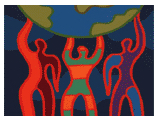

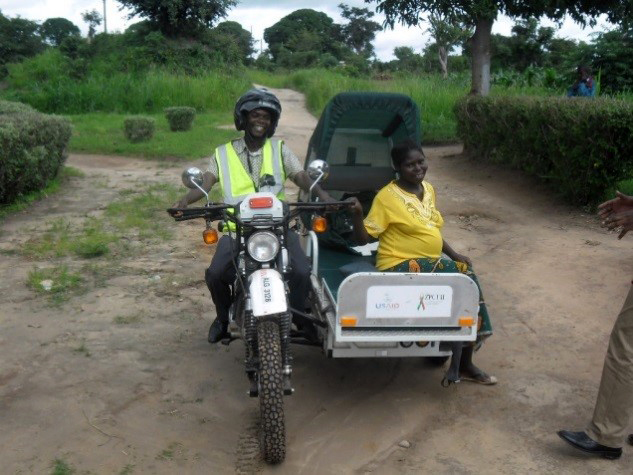 At
left is a photo of motorcycle ambulance in Zambia. The motorcycle has a
side car to transport pregnant women in rural areas, so they can reach
health centers staffed with trained birthing assistants. The rider also
has some medical training. This is a project by
At
left is a photo of motorcycle ambulance in Zambia. The motorcycle has a
side car to transport pregnant women in rural areas, so they can reach
health centers staffed with trained birthing assistants. The rider also
has some medical training. This is a project by  Women
motorcycle riders bring awareness of women's rights in
Afghanistan
Women
motorcycle riders bring awareness of women's rights in
Afghanistan




